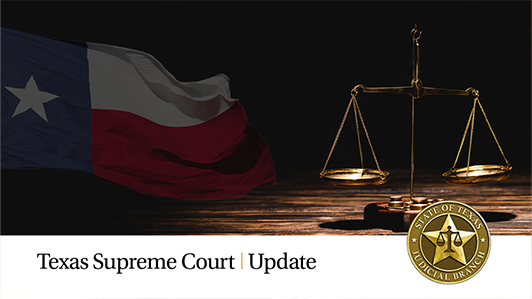
The following is a summary of selected opinions issued by the Texas Supreme Court in May 2025. This summary is prepared by court staff as a courtesy. It is not a substitute for the actual opinion. The summary is an overview; please review the entire opinion.
Tex. Dep’t of Fam. & Protective Servs. v. Grassroots Leadership, Inc., ___ S.W.3d ___, 2025 WL ___ (Tex. May 30, 2025) [23-0192]
The issues in this case are whether the plaintiff’s claims are moot and, if they are, whether the courts may nonetheless adjudicate them on the grounds the issues are of considerable public importance. The case began with a Texas Department of Family and Protective Services rule establishing licensing requirements for family residential centers used to detain immigrant families who had illegally entered the United States. Without a valid license, the federal government was barred from detaining minors for more than a brief period of time. Several mothers detained at facilities licensed under the rule, along with Grassroots Leadership, Inc., challenged the rule as invalid under state law. The trial court held the rule was invalid and enjoined the department from granting licenses under it. The court of appeals initially reversed, holding that the plaintiffs lacked standing, but this Court reversed. On remand, the court of appeals held the claims were moot because the detainees were no longer at the facilities and the capable-of-repetition-yet-evading-review exception to mootness did not apply. But the court invoked a “public-interest exception” to mootness which allowed it to reach the merits of the case. It then affirmed the trial court’s invalidation of the rule. The Supreme Court reversed the court of appeals’ judgment as to jurisdiction. All plaintiffs had been released from the facilities, and none had demonstrated a reasonable likelihood of being re-detained with minor children, so the court of appeals correctly described the case as moot. For the same reasons, the capable-of-repetition exception did not apply. The Court then held that, under the Texas Constitution’s text, structure, and history, a live dispute is essential at all stages of litigation, regardless of the importance of the underlying issues. Thus, there is no such thing as a public-interest exception to mootness in Texas, and the court of appeals erred in relying on that exception to reach the merits. Accordingly, the Court vacated the court of appeals’ judgment as to the merits, and rendered a judgment of dismissal without prejudice for lack of subject-matter jurisdiction.
